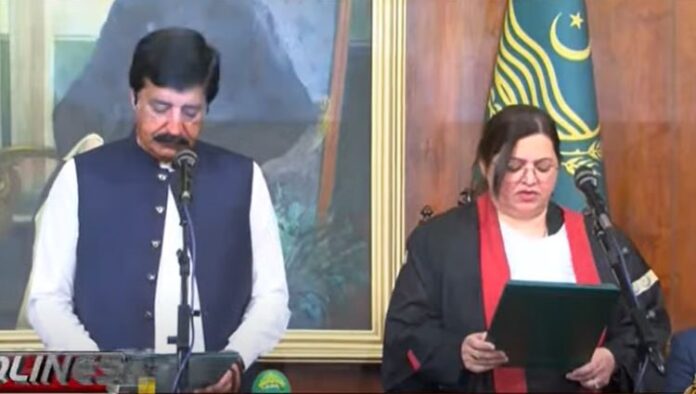LAHORE: Justice Aalia Neelum was sworn in as the Lahore High Court’s (LHC) chief justice at the Governor’s House, becoming the first woman to be elevated to the court’s top position.
Her oath-taking ceremony was held a day after President Asif Ali Zardari approved her appointment.
Last week, the Judicial Commission of Pakistan (JCP), headed by Chief Justice of Pakistan Qazi Faez Isa, greenlighted Justice Neelum’s elevation after considering the nominations of three judges for the position of LHC chief justice, including acting Chief Justice Shujaat Ali Khan and Justice Ali Baqar Najafi.
Punjab Governor Sardar Saleem Haider Khan administered the oath of office to her. At the same time, several other LHC judges – including Lahore High Court Judge Justice Ali Baqar Najafi, Justice Abid Aziz Sheikh, Justice Syed Shahbaz Rizvi, and Justice Shams Mehmood Mirza, among others – participated in the ceremony.
Punjab Chief Minister Maryam Nawaz, Law Minister Azam Nazeer Tarar, and the inspector-general of Punjab were also in attendance.
The office of LHC chief justice became vacant after the elevation of Justice Malik Shahzad Ahmad Khan to the Supreme Court on June 7, following which Justice Shujaat Ali Khan was appointed as acting LHC chief justice.
Justice Neelum stood third in the seniority list of judges of the LHC. During the June 7 meeting, the JCP had decided to consider her nomination for the office of the LHC chief justice.
Born on November 12, 1966, Justice Neelum earned her LLB degree from the University of Punjab in 1995 and was enrolled as an advocate in 1996. She was later enrolled as an advocate of the Supreme Court in 2008 and elevated to the LHC in 2013 before being sworn in as a permanent judge on March 16, 2015.
As a judge, Justice Neelum has given 203 exemplary judgments and was also the first woman administrative judge of anti-terrorism courts across the province.
She was instrumental in setting up separate courts to hear cases of gender-based violence, playing a major role in the preparation of standard operating procedures for recording evidence and statements during trials in e-courts across Punjab.


